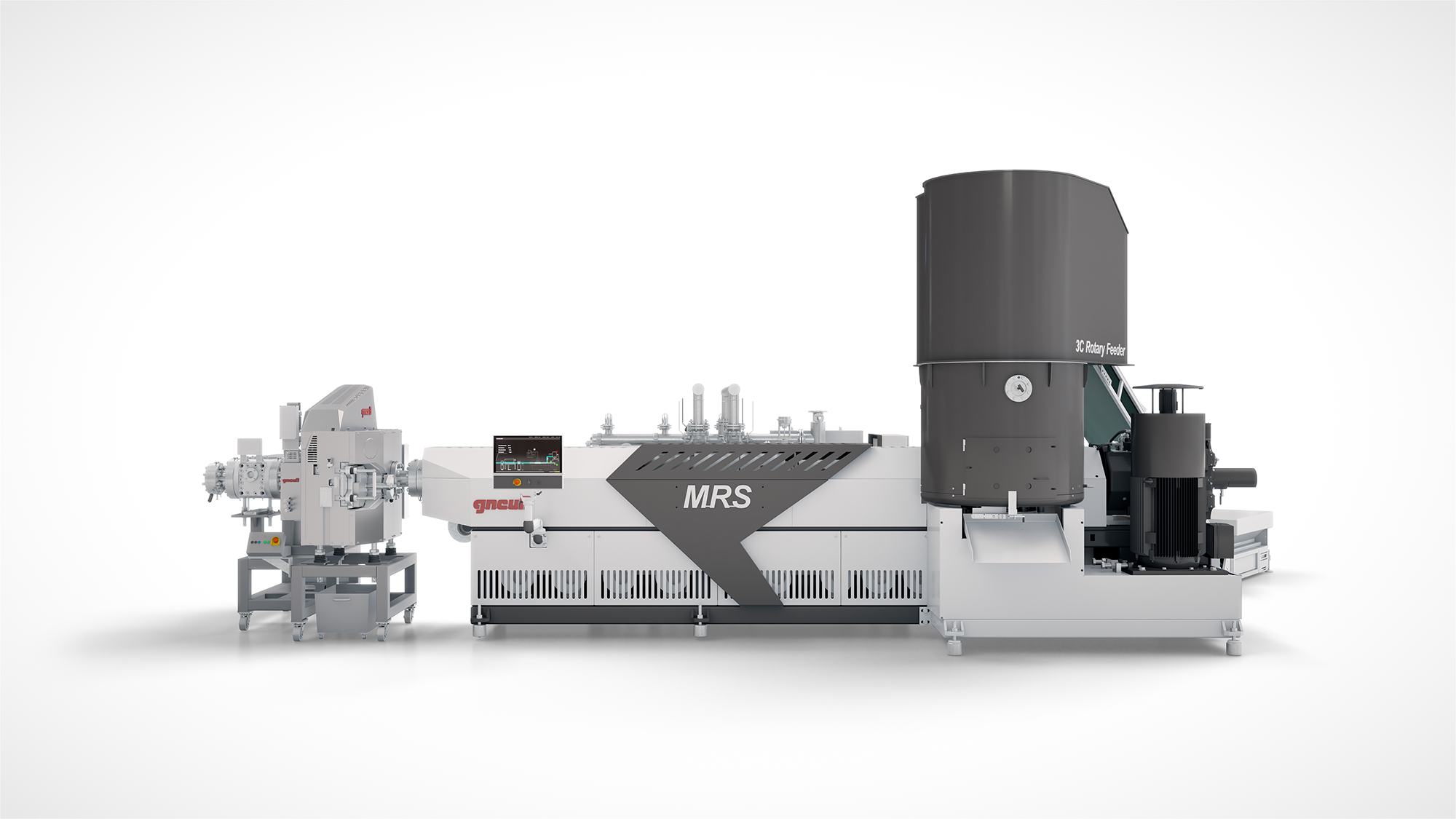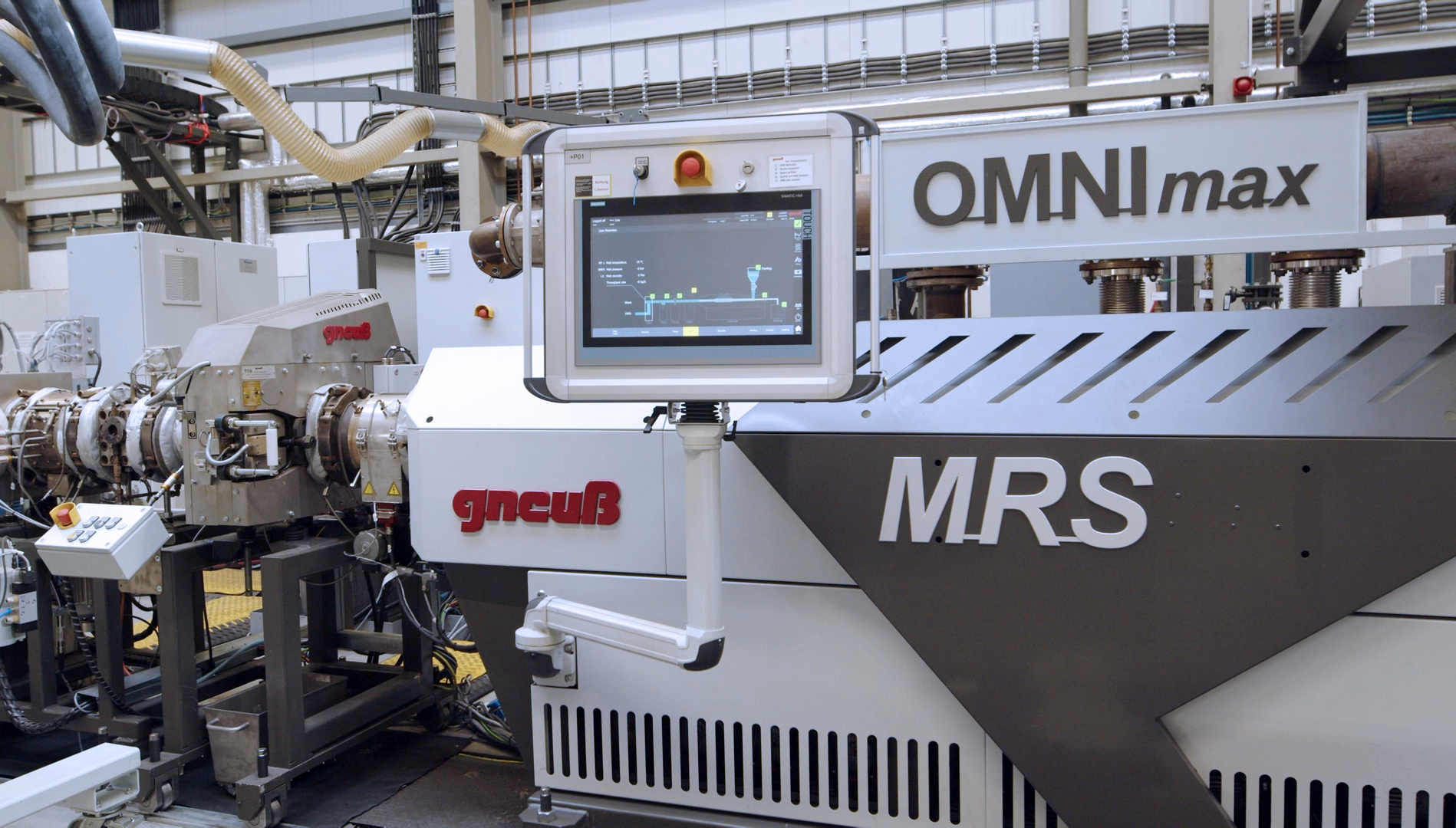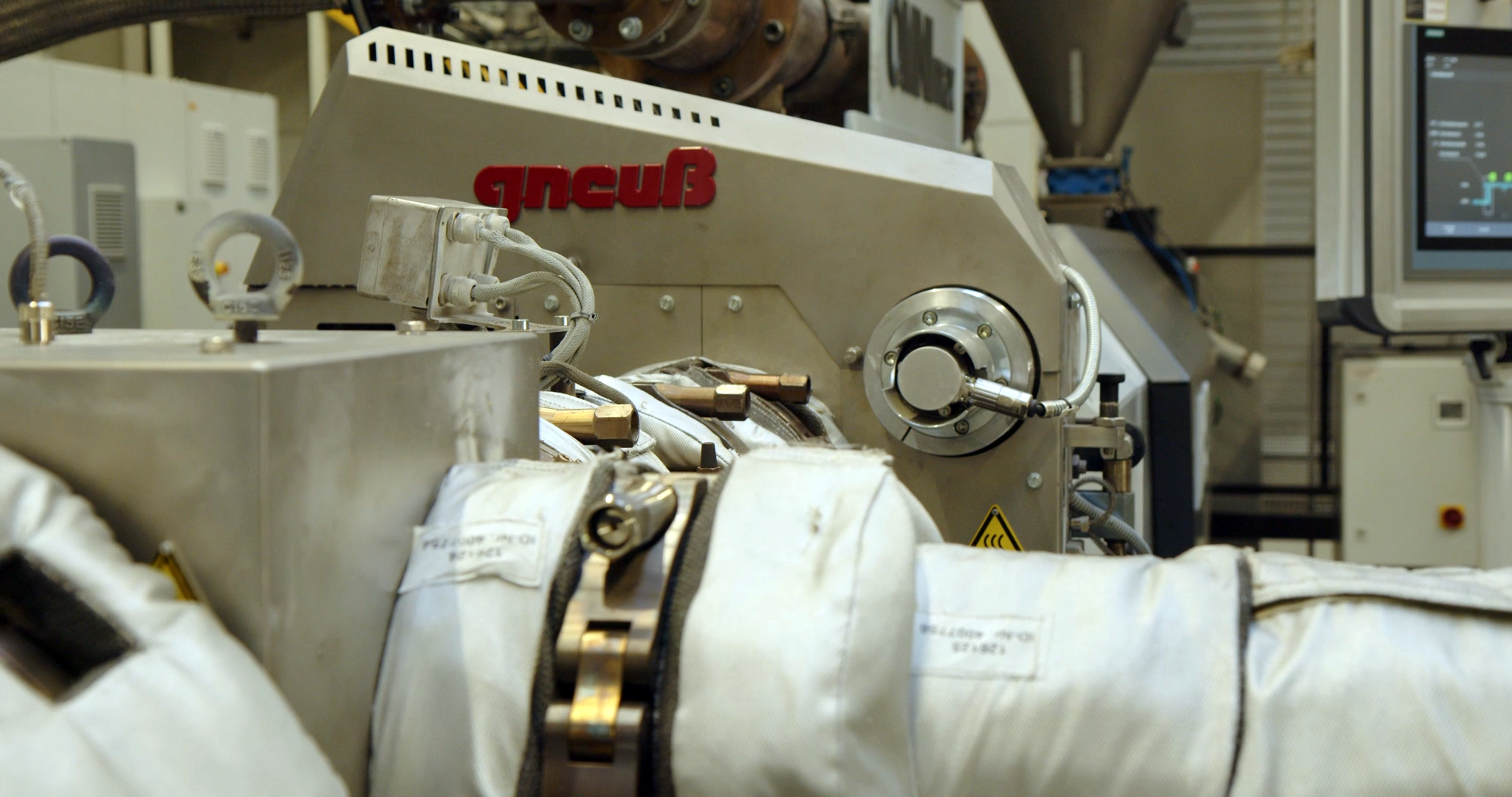Gneuss Introduces New Series of
OMNI Recycling Lines: Revolutionary Degassing and Decontamination Technologies Open Up Expanded Application Opportunities

Fig.1.: Gneuss OMNI Recycling Line with 3C Rotary Feeder, MRS Extruder, Vacuum System, Rotary Filtration System RSFgenius and Online Viscometer VIS
OMNI Recycling Machines for Closed Loop Recycling
The Gneuss MRS Extrusion Technology is well known as an alternative for the recycling of contaminated materials such as Polyester (PET), Polystyrene (PS), Polypropylene (PP) or Polyethylene (PE). In combination with Gneuss' highly efficient Rotary Filtration Systems, optimised vacuum technology, an Online Viscometer VIS and Gneuss measurement technology, customisable recycling lines can be designed for a specific material. As an option, material can be fed to the extruder via a 3C Rotary Feeder.
Multiple Letters of Non-Objection (LNOs) from US-American food & safety authorities, EFSA compliance and local approvals in Latin America confirm the decontamination efficiency of the technology.
Typical applications for OMNI recycling machines include the processing of PET scrap, such as bottles, sheet regrind or fibre waste, into high quality end products such as thermoformed sheet (suitable for food contact), staple fibre, POY, FDY, BCF or strapping. In addition, a wide range of raw materials such as PS, PP, PE, PLA can be recycled. The OMNI series is also used in the decontamination of post-consumer waste for the production of direct food contact products such as HDPE bottle caps, coffee caps and for odour reduction and degassing of PA, SAN or other polymers.
In addition to its compact design, which takes up very little space and can therefore usually be easily integrated into existing premises, the OMNI scores highly in terms of flexibility. The fully automatic control of vacuum, extruder, dosing, degassing time and filter change ensures a consistently high quality of the end product while allowing the operator to use lower cost raw materials. In today's tight and fluctuating materials market, it is becoming increasingly important to be able to produce regardless of the properties of the input materials, especially in the future when the quality of the input materials will vary and be uncertain.
The compact design also results in very low energy consumption. Any energy used in the extrusion process is designed to be used in the next process step. This not only has a noticeable effect on electricity and gas consumption, but also significantly
reduces the CO2 footprint of the recycling process.
Fig. 2: Gneuss OMNImax recycling machine with MRS extruder and RSFgenius filtration system
Multiple Screw Extruder MRS
The MRS extruder is based on conventional single screw technology but is equipped with a multiple screw section for devolatilization. It enables very efficient and gentle decontamination of the polymer melt, whilst achieving the requirements for direct food contact standards. In addition, the MRS extruder permits the processing of R-PET directly into high quality end products such as packaging sheet, strapping tape or filaments without pre-drying by using a simple and rugged vacuum system. All this is achieved by means of its unique and patented processing section. The Multi Rotation Section is a drum containing multiple satellite single screws, driven by a ring gear and pinion transmission.
The satellite screws rotate in the opposite direction to the main screw. This disproportionately increases the surface exchange of the polymer melt. A large opening for venting, exposing the full length of the satellite screws, is completely under vacuum. This provides excellent and unrestricted access to the polymer melt, the surface of which is constantly replaced at an extremely high rate by the action of the satellite screws in the multiple screw section. The surface area – and the surface area exchange rate – available for devolatilization are far greater than in other extrusion systems. As the thermal and mechanical stress on the polymer melt is minimized, reclaim processed on the MRS extruder has excellent optical and mechanical properties.
In a single, simple extrusion step, harmful contaminants can be removed so thoroughly that the resulting recycled pellets are safe for use in food contact applications.
Vacuum System
Gneuss has developed its own vacuum systems for the extraction of volatile impurities, some of which have patented separation systems. Due to the large melt surface in the MRS extruder, the suction capacity is considerably higher than in conventional systems, so that large quantities of volatile impurities can be extracted from the polymer and separated from the vacuum flow by means of automated separator systems. In addition to a water ring pump vacuum system, Gneuss also offers deep vacuum systems with appropriate separators.
The vacuum system on display is a water ring pump system designed for vacuums of
25-40 mbar and offers high automation and process control with low maintenance, even in recycling applications.
Gneuss Filtration Technology
Gneuss’ top model, the RSFgenius, operates with an integrated back-flushing system offering self-cleaning for very demanding applications and highest quality requirements. Screens can be automatically re-used up to 400 times and filtration finenesses below 10 microns/1200 mesh are available.
Retrofitting a fully-automatic RSFgenius to an existing extrusion line, whether in a pelletizing, sheet, fiber or pipe application, permits the use of more contaminated (and often cheaper) material and/or the use of finer screens. Every retrofit is tailor-made and usually without the need to move any existing equipment.
Fig. 3: Patented Rotary Filtration System RSFgenius
Gneuss will be at the Plastics Recycling World Expo Europe. Visit them at stand R326.


